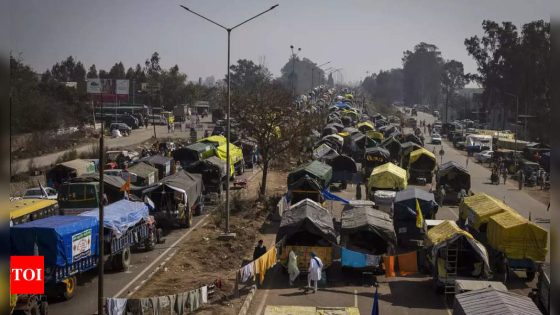NEW DELHI: The stand taken by farmers‘ union to oppose govt’s proposal for procurement of pulses, maize and cotton has come as a surprise as it was the leaders who had suggested incentivising the purchase of these produce by govt agencies. The government had come up with the proposal, citing the adverse impact that paddy cultivation was having on water table, now at an alarmingly low.
During the meetings, Punjab govt too pointed to the falling water table given the high amount of water needed for paddy cultivation, sources familiar with the deliberations told TOI. There is realisation that this kind of impact was unsustainable in the long run, as even power consumption was rising and the state was facing a burden. Neighbouring Haryana is also grappling with a similar crisis.
The farmers’ representatives were of the view that with procurement limited to paddy and wheat, growers in Punjab and Haryana were constrained from diversifying their production.
Besides, there was also a view that due to lack of procurement of pulses, whose demand is growing in India amid rising income levels, govt ends up spending foreign exchange on imports, instead of getting domestic farmers to produce the same product.
Cotton also came up for discussion, with some of the farmer representatives suggested that the ecosystem had been affected in the absence of an assurance of procurement, especially at a market-linked price.
With existing 25 % limit provided for under Price Support Scheme (PSS) meant for procurement of oilseeds, pulses and cotton at MSP, the grievances of farmers prompted the Centre to come back to the table with a plan for a five-year assured purchase from farmers who diversified into producing three major pulses (masur, arhar and urad), maize and cotton. It was also seen as a way to increase their income as maize has a short production cycle and farmers growing it could benefit from the proposed assured price scheme more than once a year.
The food ministry swiftly roped in cooperatives such as National Cooperative Consumers Federation (NCCF) and Nafed to implement the proposed scheme as there was general consensus that a law guaranteeing procurement through the C2 formula (comprehensive cost that includes imputed cost of capital and the rent on the farmers’ own land) was not feasible given the enormous fiscal impact it would have, leaving little for govt to spend on social and development needs.
The option offered by the three ministers – Agriculture Minister Arjun Munda, Food Minister Piyush Goyal and MoS home Nityanand Rai – was seen as a plan that would set in motion the process of diversification,even as negotiations continued over other issues. After the proposal was put up and talks ended early Tuesday, most union representatives appeared to be in support of the proposal put forward by the govt side and sought time to revert.
In a surprise turn, however, representatives who were present in the meeting went back as some of the farm unions, which were not involved with the talks, raised a red flag. Govt sources said the unions are seen to have come under pressure from Samyukta Kisan Morcha (SKM) leaders such as Darshan Pal and others. SKM is an umbrella body of farm unions that led a 13-month long agitation in 2020-21.
“It came as a surprise to us given that the solution that we suggested was based on the discussions,” said a govt official. “In fact, the Punjab unions involved in talks, assured the govt side that they would get back after discussion. But suddenly at around 10 pm on Tuesday, their leaders held a press conference, rejecting the proposal, hours after SKM turned down the offer,” he added.
During the meetings, Punjab govt too pointed to the falling water table given the high amount of water needed for paddy cultivation, sources familiar with the deliberations told TOI. There is realisation that this kind of impact was unsustainable in the long run, as even power consumption was rising and the state was facing a burden. Neighbouring Haryana is also grappling with a similar crisis.
The farmers’ representatives were of the view that with procurement limited to paddy and wheat, growers in Punjab and Haryana were constrained from diversifying their production.
Besides, there was also a view that due to lack of procurement of pulses, whose demand is growing in India amid rising income levels, govt ends up spending foreign exchange on imports, instead of getting domestic farmers to produce the same product.
Cotton also came up for discussion, with some of the farmer representatives suggested that the ecosystem had been affected in the absence of an assurance of procurement, especially at a market-linked price.
With existing 25 % limit provided for under Price Support Scheme (PSS) meant for procurement of oilseeds, pulses and cotton at MSP, the grievances of farmers prompted the Centre to come back to the table with a plan for a five-year assured purchase from farmers who diversified into producing three major pulses (masur, arhar and urad), maize and cotton. It was also seen as a way to increase their income as maize has a short production cycle and farmers growing it could benefit from the proposed assured price scheme more than once a year.
The food ministry swiftly roped in cooperatives such as National Cooperative Consumers Federation (NCCF) and Nafed to implement the proposed scheme as there was general consensus that a law guaranteeing procurement through the C2 formula (comprehensive cost that includes imputed cost of capital and the rent on the farmers’ own land) was not feasible given the enormous fiscal impact it would have, leaving little for govt to spend on social and development needs.
The option offered by the three ministers – Agriculture Minister Arjun Munda, Food Minister Piyush Goyal and MoS home Nityanand Rai – was seen as a plan that would set in motion the process of diversification,even as negotiations continued over other issues. After the proposal was put up and talks ended early Tuesday, most union representatives appeared to be in support of the proposal put forward by the govt side and sought time to revert.
In a surprise turn, however, representatives who were present in the meeting went back as some of the farm unions, which were not involved with the talks, raised a red flag. Govt sources said the unions are seen to have come under pressure from Samyukta Kisan Morcha (SKM) leaders such as Darshan Pal and others. SKM is an umbrella body of farm unions that led a 13-month long agitation in 2020-21.
“It came as a surprise to us given that the solution that we suggested was based on the discussions,” said a govt official. “In fact, the Punjab unions involved in talks, assured the govt side that they would get back after discussion. But suddenly at around 10 pm on Tuesday, their leaders held a press conference, rejecting the proposal, hours after SKM turned down the offer,” he added.
Source Agencies



